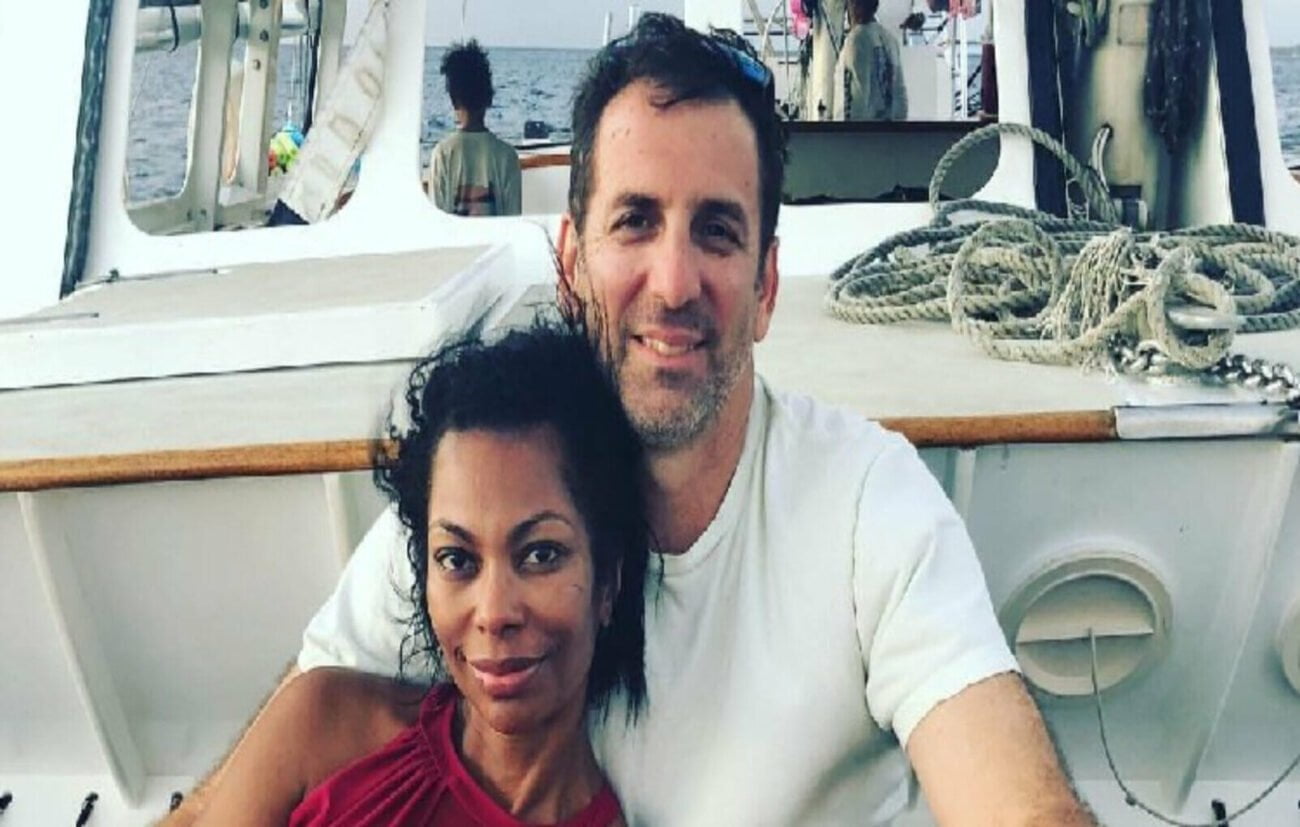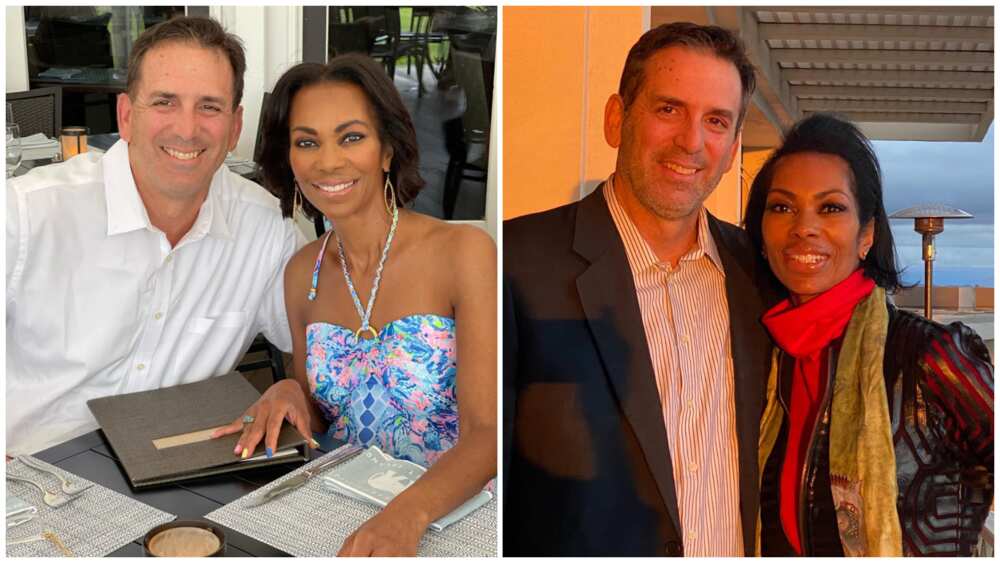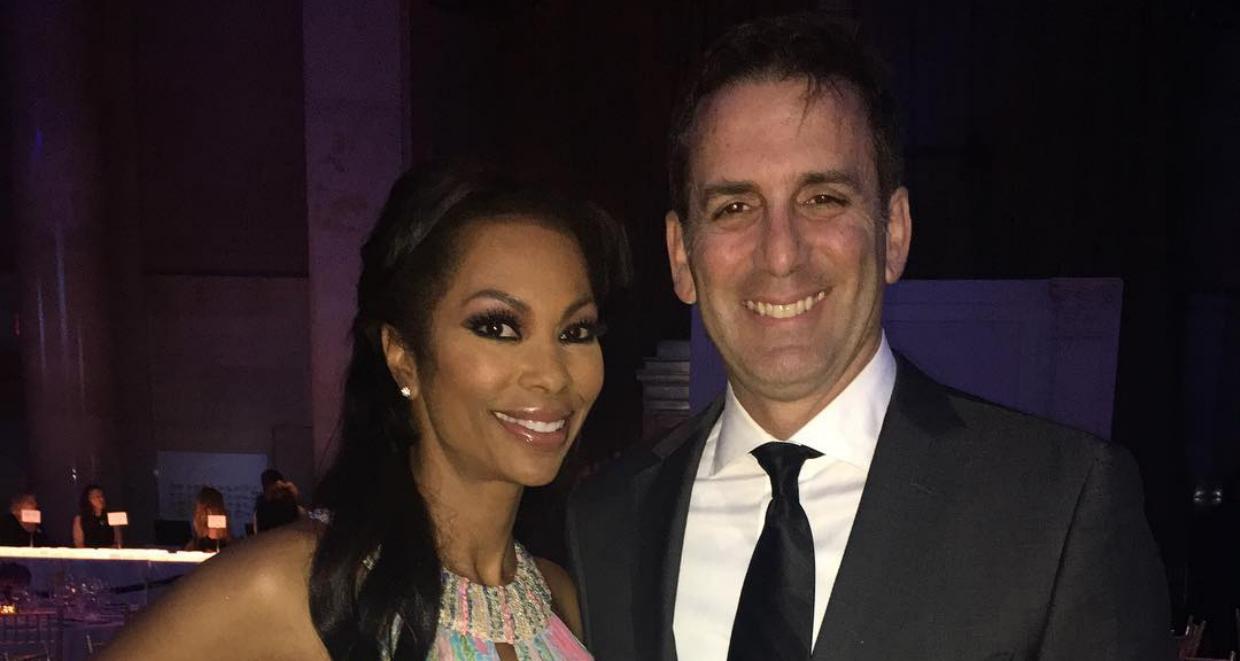Exploring Harris Faulkner Husband Religion: Beliefs & More
Does the faith of a spouse influence public perception? The question surrounding Harris Faulkner's husband's religion highlights the intense scrutiny public figures and their families face; however, it's her own spiritual stance that generates the most curiosity, though she maintains a respectful privacy, leading many to speculate about the interplay between faith, career, and personal life in the modern media landscape.
Harris Faulkner, a prominent figure in American journalism as a news anchor and commentator, finds herself in the public eye not only for her professional accomplishments but also for the details of her personal life. Married to Tony Berlin, a former Secret Service agent, Faulkner navigates the complexities of maintaining privacy while fulfilling her role in the media. While Berlin is known to be Christian, Faulkner herself has described herself as a "person of faith," opting to keep her specific religious affiliation private. This decision raises important questions about the boundaries between public life, personal beliefs, and the right to privacy, especially in an era of constant media coverage and social media engagement. The exploration of "harris faulkner husband religion," therefore, delves into broader themes of faith, privacy, and public perception.
In a society that values both religious freedom and transparency, the choices of public figures regarding their faith often become subjects of public discourse. However, it is crucial to recognize that religious belief is a deeply personal matter, and individuals have the right to determine the extent to which they share this aspect of their lives. Harris Faulkner's approach underscores the importance of respecting individual autonomy and avoiding speculation about matters that are inherently private. In her professional career, she shows her integrity and respect to her professional ethics. As a prominent news figure, the personal information and the details about the family will be in media, but she is managing it very well by not discolosing more about her religion.
- Unlocking Your April Zodiac Sign Traits Compatibility More
- Rumors Is Simone Biles Pregnant The Truth Revealed 2024 Update
| Attribute | Details |
|---|---|
| Name | Harris Faulkner (ne Harris Kimberley Faulkner) |
| Spouse | Tony Berlin |
| Occupation | News Anchor, Commentator, Author |
| Religion | Christian (self-described "person of faith," denomination undisclosed) |
| Date of Birth | October 13, 1965 |
| Place of Birth | Atlanta, Georgia, USA |
| Education | B.A. Mass Communications, Cum Laude, Stephens College |
| Children | Two daughters |
| Awards | Six Emmy Awards |
| Notable Work | "The Faulkner Focus" (Fox News), "Outnumbered" (Fox News) |
| Official Website | Fox News Profile |
The nuances of faith and its relationship to public life are further complicated by the diverse landscape of religious beliefs in America. The United States prides itself on its commitment to religious freedom, enshrined in the First Amendment of the Constitution. This foundational principle ensures that individuals have the right to practice their faith without government interference and to abstain from religious expression if they so choose. Harris Faulkner's reticence about her specific religious affiliation aligns with this constitutional guarantee, as she exercises her right to personal privacy in matters of faith. The public discussion surrounding "harris faulkner husband religion," therefore, is a reflection of the broader tension between the public's curiosity about the lives of prominent figures and the individual's right to maintain a private sphere.
The focus on "harris faulkner husband religion" also underscores the cultural tendency to link individuals' beliefs with their actions and values. In many societies, religious affiliation is seen as a key indicator of moral character and ethical conduct. However, such assumptions can be misleading, as individuals within any given religious group may hold diverse perspectives and engage in a wide range of behaviors. Furthermore, individuals who do not identify with any particular religion may still adhere to strong moral principles and contribute positively to society. Therefore, while it is natural to be curious about the religious beliefs of public figures, it is essential to avoid making generalizations or judgments based solely on their perceived or stated affiliations. The richness and complexity of human experience cannot be reduced to simple religious labels.
Examining the question of "harris faulkner husband religion" also requires considering the potential impact of public disclosure on an individual's career and personal life. In the media industry, where perceptions of impartiality and objectivity are highly valued, revealing specific religious affiliations could lead to accusations of bias or favoritism. This is particularly true in the context of news reporting, where journalists are expected to present information in a fair and unbiased manner. While it is impossible to completely eliminate personal perspectives from news coverage, journalists strive to maintain professional standards of objectivity and to avoid allowing their personal beliefs to unduly influence their reporting. In Harris Faulkner's case, her decision to keep her religious affiliation private may be motivated, in part, by a desire to uphold these professional standards and to avoid any appearance of bias in her work.
- Yellowstones Future Whats Next For Kevin Costners Role
- Who Is Otto Kilcher A Look At The Life Of The Alaskan Legend
Moreover, public disclosure of religious beliefs can expose individuals to potential discrimination or harassment. In an increasingly polarized society, religious differences can become sources of conflict and division. Individuals who openly express their religious beliefs may become targets of criticism or even violence from those who hold opposing views. This is particularly true for members of minority religious groups, who may face prejudice and discrimination in various aspects of their lives. Therefore, the decision to keep one's religious beliefs private can be seen as a form of self-protection, especially for individuals who are already in the public eye.
The emphasis on "harris faulkner husband religion" raises the critical point of the intersectionality of identity. A person's religious identity, or lack thereof, is just one facet of a multifaceted persona. Ethnicity, gender, socioeconomic background, and political views all converge to shape an individual's unique perspective. By concentrating solely on religious affiliation, there's a risk of overshadowing other crucial aspects that contribute to an individual's character and worldview. Harris Faulkner, as a successful African American woman in a prominent media role, brings a wealth of experiences and perspectives to her work. Focusing exclusively on her or her husband's religious beliefs diminishes the richness of her overall identity and the diverse influences that inform her journalism.
The discussion surrounding "harris faulkner husband religion" often arises in the context of broader conversations about the role of faith in public life. In many societies, religious institutions and beliefs play a significant role in shaping social norms, political discourse, and cultural values. Public figures, whether they are politicians, celebrities, or journalists, are often asked to comment on issues related to faith and morality. However, it is important to recognize that not everyone feels comfortable discussing their religious beliefs in public, and individuals have the right to decline to do so. Respecting this right is essential for maintaining a pluralistic society where diverse perspectives are valued and individuals are free to express or abstain from religious expression as they choose.
Furthermore, the question of "harris faulkner husband religion" underscores the complexities of navigating interfaith relationships. In a diverse society, it is increasingly common for individuals to form relationships with people who hold different religious beliefs. These relationships can be enriching and rewarding, but they can also present challenges related to differing values, traditions, and practices. Open communication, mutual respect, and a willingness to compromise are essential for navigating these challenges successfully. In the case of Harris Faulkner and Tony Berlin, their marriage demonstrates that individuals from different religious backgrounds can build strong and lasting relationships based on love, trust, and shared values.
The intense curiosity surrounding "harris faulkner husband religion" is indicative of a broader societal trend: the increasing blurring of lines between public and private life. In the digital age, where social media platforms provide constant access to individuals' thoughts and activities, maintaining privacy has become increasingly challenging. Public figures, in particular, face the constant pressure of scrutiny from the media and the public, who often feel entitled to know every detail of their lives. However, it is essential to recognize that even public figures have a right to privacy and that there are limits to what should be considered fair game for public consumption.
| Name | Spouse | Occupation | Religion |
|---|---|---|---|
| Harris Faulkner | Tony Berlin | News Anchor and Commentator | Christian (undisclosed denomination) |
Harris Faulkner's choice to maintain discretion regarding her religious identity highlights the concept of personal autonomy, a value deeply embedded in Western liberal thought. Autonomy, in this context, refers to the right of individuals to make their own choices about matters that are fundamental to their sense of self, free from undue interference or coercion. This encompasses the freedom to define one's own beliefs, values, and lifestyle, and to express or withhold these aspects of oneself as one sees fit. By declining to publicly identify with a specific religious affiliation, Faulkner asserts her autonomy over her own spiritual identity and resists external attempts to define her based on religious categories.
The pursuit of understanding "harris faulkner husband religion" also brings to the surface the power dynamics inherent in public discourse. The media, with its capacity to shape public opinion and influence perceptions, plays a critical role in how individuals and groups are portrayed. Public figures, particularly those from marginalized communities, may face heightened scrutiny and pressure to conform to certain expectations or stereotypes. This can create a climate of self-censorship, where individuals feel compelled to suppress certain aspects of their identity in order to avoid negative attention or discrimination. Harris Faulkner, as an African American woman in a prominent media position, may be particularly aware of these dynamics and may choose to exercise caution in disclosing personal information that could be used to undermine her credibility or authority.
Furthermore, the focus on "harris faulkner husband religion" can be viewed through the lens of symbolic politics. In many societies, religious symbols and affiliations carry significant social and political weight. Public figures may strategically use their religious identity to signal certain values or align themselves with particular constituencies. Conversely, they may choose to downplay or conceal their religious affiliation in order to appeal to a broader audience or avoid alienating potential supporters. Therefore, the question of "harris faulkner husband religion" is not simply about individual beliefs but also about the strategic use of religious identity in the public sphere.
Ultimately, the examination of "harris faulkner husband religion" is a reminder of the importance of respecting individual boundaries and avoiding unwarranted intrusion into personal matters. While curiosity about the lives of public figures is natural, it is essential to balance this curiosity with a commitment to privacy and ethical conduct. Individuals have the right to define themselves on their own terms, and it is not appropriate to impose external labels or judgments based on limited information. By respecting individual autonomy and promoting a culture of empathy and understanding, we can create a more inclusive and tolerant society where diverse perspectives are valued and individuals are free to express or withhold their beliefs as they choose.
The media's role in shaping the narrative around figures like Harris Faulkner cannot be understated. Outlets often walk a tightrope between informing the public and sensationalizing personal details. The very act of investigating "harris faulkner husband religion" speaks to this dynamic. While it may stem from genuine curiosity, it also runs the risk of fueling speculation and potentially misrepresenting her beliefs or values. A responsible approach acknowledges the limits of public inquiry and respects the individual's right to define their own narrative.
Also considering the potential for misinformation is crucial. In the age of digital media, rumors and unsubstantiated claims can spread rapidly, particularly regarding public figures. The quest to understand "harris faulkner husband religion" is no exception. Without direct confirmation from Faulkner herself, any assertion about her specific religious beliefs should be treated with skepticism. Responsible journalism demands a commitment to accuracy and a willingness to challenge unsubstantiated claims.
The lack of public comment from Faulkner on interfaith matters opens another avenue for consideration. Her silence doesn't necessarily equate to indifference; rather, it could indicate a deliberate choice to avoid potential controversy or to maintain a neutral stance in her public role. It's equally plausible that she engages in interfaith dialogue privately, without seeking public recognition. This underscores the importance of avoiding assumptions and respecting an individual's decision to keep their involvement in such activities confidential.
Reflecting on Faulkner's career trajectory offers further insight into her priorities. As a successful journalist and news anchor, she has consistently demonstrated a commitment to professional excellence and ethical reporting. Her focus has remained on delivering accurate and informative news, rather than using her platform to promote personal beliefs or agendas. This dedication to journalistic integrity may be a key factor in her decision to keep her religious views private, ensuring that her reporting remains unbiased and credible.
| Name | Spouse | Occupation | Religion |
|---|---|---|---|
| Harris Faulkner | Tony Berlin | News Anchor and Commentator | Christian (undisclosed denomination) |
Harris Faulkner's approach to her public image is a masterclass in navigating the pressures of modern media. By prioritizing professionalism and maintaining a clear boundary between her public and private lives, she sets an example for other public figures. Her decision to keep her religious beliefs private is not a sign of secrecy or evasion, but rather a deliberate choice to protect her personal autonomy and ensure that her work remains focused on serving the public good.
The ongoing discussion about "harris faulkner husband religion" should prompt a wider conversation about the expectations we place on public figures and the level of transparency we demand from them. While it is natural to be curious about the lives of those in the public eye, we must also recognize their right to privacy and avoid imposing undue pressure on them to reveal personal details that they prefer to keep private. A more respectful and nuanced approach to public discourse is essential for fostering a society that values both transparency and individual autonomy.
Ultimately, the details of Harris Faulkner's husband's religion, or her own specific denomination, are less important than the values she embodies and the contributions she makes to the field of journalism. Her commitment to integrity, accuracy, and fairness should be the primary focus of public attention, rather than speculation about her personal beliefs. By shifting the emphasis from private matters to public achievements, we can promote a more balanced and respectful understanding of public figures and their roles in society.
The "harris faulkner husband religion" discourse is a microcosm of larger issues surrounding faith, privacy, and public scrutiny. It reminds us to respect boundaries, avoid assumptions, and focus on an individual's actions and values rather than attempting to define them by their religious affiliation. In a world where personal information is increasingly accessible, upholding the right to privacy is more crucial than ever.
| Attribute | Details |
|---|---|
| Beliefs | Faulkner's personal religious beliefs are not publicly known, reflecting her commitment to privacy. |
| Practices | It is unclear whether Faulkner engages in any specific religious practices publicly, as she maintains a private approach to her faith. |
| Affiliation | Faulkner has not publicly identified with any particular religious denomination or organization. |
| Influence | It is unknown to what extent Faulkner's religious beliefs, if any, influence her personal life or professional career. |
| Values | Faulkner has expressed values such as compassion, integrity, and service, which may or may not be directly influenced by her religious beliefs. |
| Interfaith | Faulkner has not publicly commented on interfaith dialogue or cooperation, possibly due to her preference for privacy. |
| Privacy | Faulkner's decision to keep her religious beliefs private is consistent with her right to privacy and personal autonomy. |
The pursuit of understanding "harris faulkner husband religion" is a reflection of a larger societal tendency to seek definitive answers and categorize individuals. However, human identity is rarely so neatly defined, and religious affiliation is just one aspect of a complex and multifaceted self. Embracing ambiguity and respecting individual choices about self-disclosure are essential for fostering a more tolerant and understanding society.
Looking forward, it's likely that figures like Harris Faulkner will continue to navigate the tension between public life and personal privacy with care. As media landscapes evolve and societal expectations shift, the strategies for maintaining boundaries may also change. However, the fundamental right to privacy and the importance of respecting individual autonomy will remain enduring principles.
The very phrase "harris faulkner husband religion" encapsulates the public's fascination with the personal lives of those in the spotlight. However, a more constructive approach involves focusing on their contributions to society and respecting their choices regarding self-disclosure. By shifting the narrative from private matters to public achievements, we can foster a more balanced and ethical media landscape.
- All About Davido Height And Weight Plus More Bio Details
- Ella Riley Green Inside Their Relationship Year Facts

Understanding Harris Faulkner's Husband And His Religion

Understanding Harris Faulkner's Husband And His Religion

Tony Berlin, Harris Faulkner’s husband Bio Religion, CNN, Age, Net